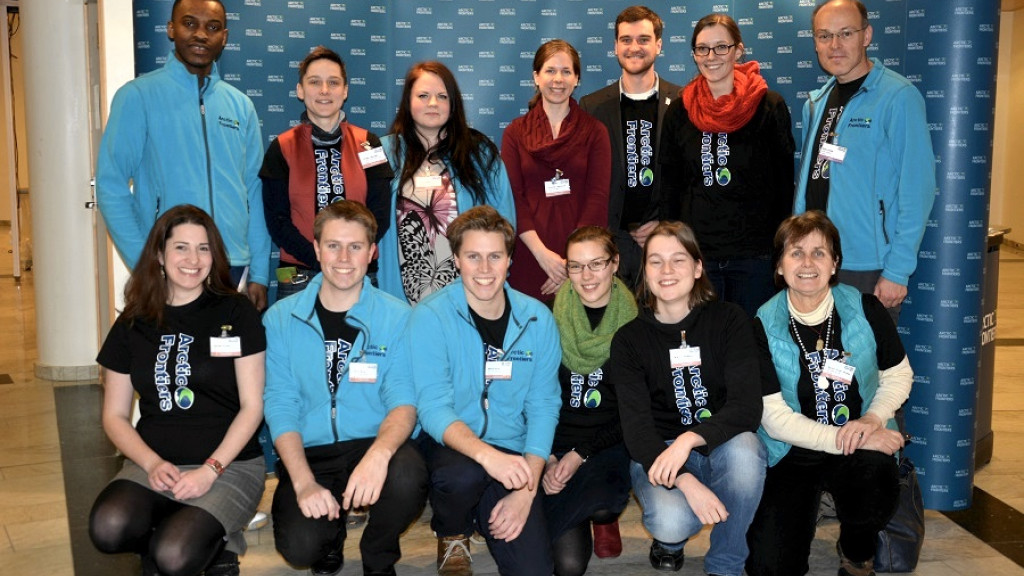At the Arctic Frontiers Conference in Tromsø
From January 19th to 24th, IPF visiting fellow Corinna Röver volunteered at the 8th annual Arctic Frontiers conference in Tromsø, Norway. In exchange for volunteering her time to help with the organization of the annual conference, Corinna was able to gain access to most of the conference sessions.
Tromsø can really be thought of as the research hub of the Arctic. The city of roughly 70 000 people not only hosts the prestigious Fram High North Research Centre for Climate and Environment, but also the world’s northernmost university which is at the forefront of Arctic Research.
The Arctic Frontiers conference has grown steadily over the past few years, and those who attended the International Polar Foundation’s Arctic Futures Symposium past October have met many familiar faces in Tromsø.
Focusing on the Arctic’s human dimension
This year’s conference, titled “Humans in the Arctic”, placed a clear focus on the people living in the region. The exceptionally busy two-day policy section on Monday January 20th and Tuesday January 21st featured high-level speakers such as the Prime Ministers of Norway and Greenland, Erna Solberg and Aleqa Hammond respectively, as well as foreign ministers from Iceland and Finland, and many ambassadors from Arctic nations and nations interested in the Arctic.
Volunteer work, microphones & headsets
Volunteers were tasked with handing out translation headsets to the audience in the main auditorium (which allows you to listen to the speeches), and helping the speakers attach microphones and headsets (you can’t get any closer to international decision makers, can you?). The only thing that can get between you listening to Norwegian Prime Minister Erna Solberg’s keynote speech is being scheduled to work at the conference secretariat, the main organization hub of the conference.
At least we were able to watch live streaming of the conference on Arctic Frontiers website, which provides video podcasts of the policy section that took place during the first two days of the event.
I really enjoyed listening to Aleqa Hammond’s vision of a politically entirely independent Greenland while printing out speakers’ notes for interpreters, or receiving presentations from some speakers at the last minute.
Science sessions
The science sessions from Wednesday to Friday (January 22nd - 24th) focused on health and well-being, shipping and offshore activities, and search and rescue (SAR) efforts in the Arctic. While the latter sessions addressed issues of Arctic marine governance and technological advances in technical navigation and offshore operations, the former focused on the effects of the Arctic environment on its inhabitants:
- how to deal with frostbite and avoid amputation,
- immersion in freezing water,
- contaminants in local food sources,
- improving search and rescue operations,
- etc.
Freeze your brain an you’ll (likely) make it!
Some research findings, such as those of Michael Tipton from the University of Portsmouth, were quite surprising to me.
I believed that people typically died from hypothermia when exposed to very cold water, but his research suggests that the majority of deaths occur in the first minutes due to a cold shock.
Counterintuitively, total submersion in cold water could give a person a better chance of survival than an immersion where the head sticks out of the water. A sufficiently fast cooling of the brain could, under certain circumstances, enable a person to survive total submersion in cold water for up to 90 minutes if the water is cold enough. Findings like these can help improve the way search and rescue operations are undertaken.
Feasting on King Crab and Reindeer filet
Apart from the captivating research findings, the Science Banquet on Thursday evening was another highlight of the conference, which the volunteers at Arctic Frontiers were able to take part in for free. Tender reindeer filet, king crab, whale meat and shrimps were on the menu. Volunteering at Arctic Frontiers is definitely worth your time!

